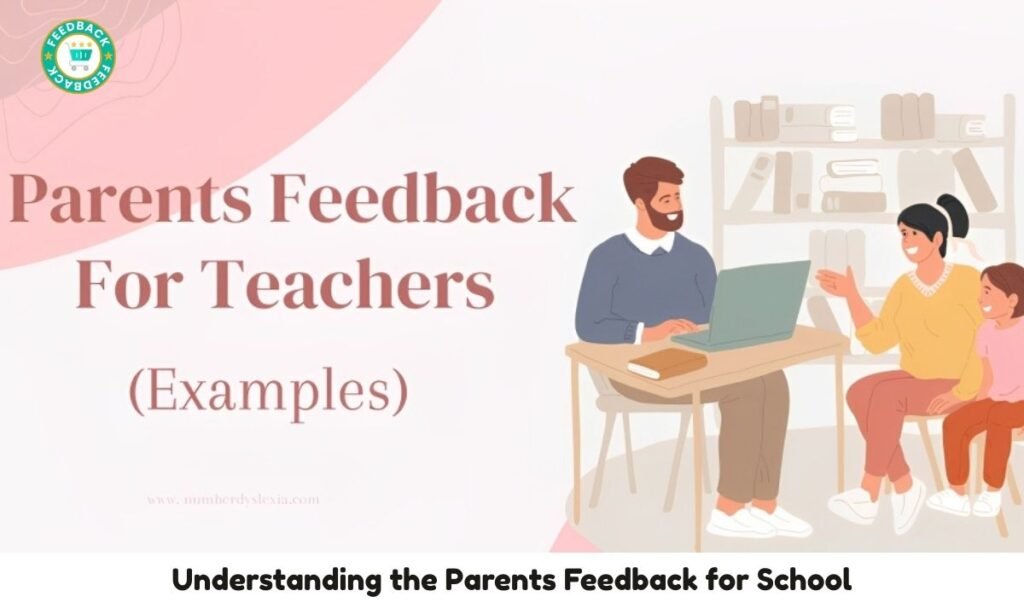We all are aware that in today’s rapidly changing world, our educational environment needs to adapt to the constant change. It is through this evolution that the education system has become invaluable, where parents also play a crucial role in shaping the overall growth of students and the educational system. Parents Feedback for School plays a very crucial role in shaping the academic, emotional, and social development of students. Therefore schools that actively seek and integrate feedback from parents help in creating a stronger relationship and improve communication and overall understanding between school and their students.
Why Parents Feedback for School Matters?
If you are wondering why parents feedback for school even matters then let us tell you that, Parents Feedback acts as a bridge between home and educational institutions. Through this feedback educators get an insight into the student’s life even outside the classroom, thereby helping them understand the improvement areas of the students, and parents help in providing a unique perspective towards their child and their needs and behaviors, hence making educators alert for the challenges that might not be visible to them during the school hours. For instance, some of the areas could be emotional stress, bullying, or learning difficulties.
In addition to all this consistent feedback helps empower the schools to be more transparent and accountable to guardians. When the schools welcome input from families, it not only helps in enhancing their trust but also encourages parents to take a more active role in the learning journey of their child. This in turn also reinforces the ideas that education is a shared responsibility to shape a better society.
Different Ways of Collecting Parents Feedback for School
To gain meaningful insights, schools must adopt a variety of strategies to gather parents feedback for school. These methods should be inclusive, easily accessible, and culturally sensitive. Common tools include:
- Surveys and Questionnaires: Digital and paper-based surveys allow parents to provide structured feedback on various aspects such as curriculum, teaching quality, school facilities, safety, and communication.
- Parent-Teacher Conferences: These one-on-one meetings are an excellent opportunity for parents to discuss their child’s progress and voice any concerns or suggestions directly with educators.
- Suggestion Boxes: Anonymity can sometimes encourage more honest and critical feedback. Suggestion boxes placed in common areas allow parents to share their views freely.
- Online Platforms and Portals: Many schools now use digital platforms where parents can leave feedback, check updates, and stay connected with teachers in real time.
- Focus Groups and Forums: Organizing small group discussions allows for more detailed and qualitative feedback, fostering a sense of community and collaboration among parents and staff.
How Can Schools Use Parents Feedback for School?
Once parents feedback for school collected, the next step is for educational institutions to analyze and act on it effectively. Forward-thinking schools treat this input as data, categorizing it into themes such as academics, safety, extracurricular activities, communication, and facilities.
Action plans then created to address specific concerns. For example, if feedback reveals dissatisfaction with the school’s communication methods, administrators may implement more consistent updates via newsletters or apps. If parents express concern over safety, the school might review its supervision protocols or improve infrastructure like lighting and security systems.
Moreover, some schools involve parent advisory committees in decision-making processes, ensuring that parents feedback not just heard but integrated into the school’s strategy and policy changes.
Impact of Parents Feedback for School on Students
The ripple effects of integrating parents feedback for school into daily operations are substantial. Research consistently shows that students perform better academically when their parents are actively involved in school activities. Attendance rates improve, behavioral issues decline, and overall student morale increases when children know their parents and teachers are working together.
In addition, parents who feel heard and valued are more likely to support school initiatives, volunteer for events, and help reinforce school values at home. This level of engagement creates a positive school culture where students thrive.
Challenges in Gathering Parents Feedback for School
While the importance of parents feedback is well recognized, gathering and utilizing this feedback comes with challenges. Language barriers, cultural differences, and varying levels of digital literacy can hinder some parents from participating. Schools must proactively address these barriers by offering multilingual communication, providing training on using digital platforms, and creating inclusive environments that welcome feedback from all demographics.
Another common issue is the gap between feedback collection and visible action. Parents may become disengaged if they feel their input doesn’t lead to meaningful changes. Thus, it’s essential for schools to not only collect feedback but also close the feedback loop by communicating how their input is being used.
Conclusion
In conclusion, parents feedback for school is an essential pillar of a successful educational framework. It enhances transparency, strengthens relationships, and drives continuous improvement. Schools that actively listen to and act upon parental input not only demonstrate respect and collaboration but also set a powerful example for their students. As education continues to evolve, fostering strong school-home partnerships through consistent and meaningful feedback will be key to ensuring student success and community well-being.
Also Read About –



